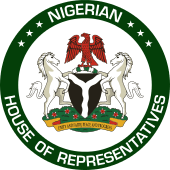House of Representatives (Nigeria)
| House of Representatives | |
|---|---|
| 4th National Assembly | |
 | |
| Type | |
| Type | |
| Leadership | |
| Structure | |
| Seats | 360 |
 | |
Political groups |
Governing Party Opposition Parties
|
| Elections | |
| First-past-the-post | |
Last election | April 2015 |
| Meeting place | |
 | |
| Abuja | |
| Website | |
| http://www.nass.gov.ng | |
 |
| This article is part of a series on the politics and government of Nigeria |
| Nigeria portal |
|
Politics portal |
The House of Representatives is the lower house of the country's bicameral National Assembly. The Senate of Nigeria is the upper house.
The current House of Representatives, formed following elections held in April 2015, has a total of 360 members who are elected in single-member constituencies using the simple majority (or first-past-the-post) system. Members serve four-year terms. The Speaker of the Nigerian House of Representatives is the presiding officer of the house.
Nigerian state delegations
|
 |
Members (since 1980s)
- List of members of the House of Representatives of Nigeria, 1983–1992
- List of members of the House of Representatives of Nigeria, 1992–1998
- List of members of the House of Representatives of Nigeria, 1998–1999
- List of members of the House of Representatives of Nigeria, 1999–2003
- List of members of the House of Representatives of Nigeria, 2003–2007
- List of members of the House of Representatives of Nigeria, 2007–2011
- List of members of the House of Representatives of Nigeria, 2011–2015
- List of members of the House of Representatives of Nigeria, 2015–present
See also
- History of Nigeria
- Legislative branch
- List of national legislatures
- Nigerian First Republic
- Nigerian Second Republic
- Nigerian Third Republic
- Nigerian Fourth Republic
| ||||||||||||||||||||||||||
Coordinates: 9°04′05″N 7°30′40″E / 9.06806°N 7.51111°E
This article is issued from Wikipedia - version of the Monday, February 15, 2016. The text is available under the Creative Commons Attribution/Share Alike but additional terms may apply for the media files.